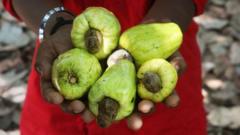Ghana's cashew nut industry presents a paradox: despite being the world's third-largest exporter of unprocessed cashews, the nation grapples with severe obstacles preventing it from maximizing the economic potential presented by this lucrative crop. The situation was starkly highlighted during a recent visit to Accra, where I encountered a street vendor selling roasted cashews at a staggering markup—a clear sign of the disconnect between local farmers and retail prices.
Ghana produces around 180,000 tonnes of cashews annually, with over 80% exported as raw, unshelled nuts, generating approximately $300 million in export revenues. Yet, farmers like Nashiru Seydou from the north-east express despair over the hardships of farming; he typically earns just $50 for a large 100kg sack of unshelled cashews. This underlines the urgent need for government intervention to elevate the industry.
Bright Simons, an economic commentator, notes the dramatic disparity in pricing, where roasted cashew nuts can fetch between $20,000 and $40,000 per tonne for retailers, compared to the mere $500 that farmers receive. This dynamic has led to initiatives aimed at increasing local processing, spearheaded by entrepreneurs such as Mildred Akotia, whose company, Akwaaba Fine Foods, only processes 25 tonnes per year due to high machinery costs and lack of accessible financing.
Despite previous attempts by the Ghanaian government to ban raw cashew exports to encourage local processing, such strategies has met with backlash, revealing the delicate balance needed in policy-making. Discussions of increased tariffs on raw exports and regulations also ensue but face criticism from experts like Simons and economist Prof. Daron Acemoglu, who argue that focus should pivot towards improving local business capabilities and market access for processed cashews instead.
With aspirations to tap into international demand, Akotia emphasizes the vibrant market potential, not just locally but globally, aiming to revamp Ghana's image in processed food. However, infrastructural challenges, including transportation and lack of skilled labor, remain significant hurdles. Simons warns that many talented entrepreneurs are leaving Ghana for better opportunities elsewhere, stifling domestic growth.
As the nation looks to increase its cashew processing, it faces a vital turning point—success depends heavily on balancing domestic production, enhancing processing capacity, and penetrating international markets effectively.





















